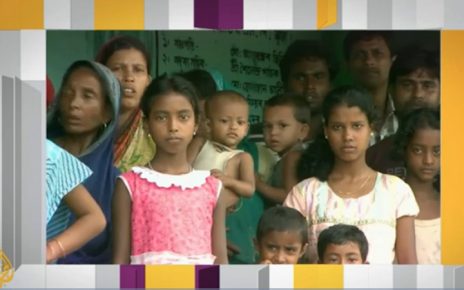By PARTH M.N. and SHASHANK BENGALI
AUG 20, 2018 | 11:45 AM
The men barged into Surendra Kumar’s home after a court hearing tied to his daughter’s accusation that a politician from the country’s most powerful party had raped her.
The four assailants beat him with sticks, guns and belts, leaving him unconscious, family members said.
In response to the April attack, Kumar, of Unnao, filed a complaint with police in the northern Indian state of Uttar Pradesh, accusing the politician’s brother of being one of his assailants. Several hours later, Kumar, to his shock, was arrested on criminal intimidation charges and jailed.
After six days, police told Kumar’s relatives that he had died in custody. He was 45.
The case would soon explode into national headlines when a court accused state authorities of conspiring with the politician, state lawmaker Kuldeep Singh Sengar, to shield him from punishment and failing to protect the alleged rape victim and her family.
But Kumar’s was just one of a growing number of deaths of detainees in India, where roughly five people die every day in police and judicial custody, according to the Asian Center for Human Rights, a New Delhi advocacy organization.
The center reported recently that 1,674 Indians had died in custody in the 11 months ending in February, the vast majority while awaiting trial, according to statistics provided by India’s home affairs ministry in response to a request from Parliament.
That represented a nearly 25% increase in the rate of deaths from 2001 to 2010, the center said, citing data from India’s National Human Rights Commission.
“This is an unusually high number,” said Vikram Singh, a retired former head of police in Uttar Pradesh.
Singh acknowledged that authorities often failed to ensure that detainees were protected from harassment and violence by officers.
Of the 1,674 deaths, about 10% occurred when the victims were in police custody, usually at police stations, but prior to an appearance before a judge. Human rights groups say detainees in these circumstances are at the gravest risk of torture by police seeking to punish them, obtain information or force confessions.
The remainder of deaths occurred when detainees were in jails awaiting or undergoing trials in what is known as judicial custody, the center said.
India, a country of 1.3 billion people, has a relatively small prisoner population of about 400,000; the U.S. holds five times as many. But two-thirds of Indians behind bars have never been convicted of a crime. Many are held for longer than their maximum sentences because their cases are delayed, they can’t afford or are denied bail, or they lack legal counsel.
While in jail, detainees are often kept in overflowing cells without adequate medical care — the country’s Supreme Court recently said inmates were being treated “like animals” — and still face the threat of torture by police and other authorities, the center said.
“Overcrowding of inmates and inhumane living conditions also contribute to the deaths, but that does not mean torture doesn’t happen in judicial custody,” said Suhas Chakma, the center’s director.
The center called on India to ratify the United Nations Convention Against Torture and strengthen national laws prohibiting and punishing abuse of detainees.
Singh said that custody deaths could be prevented if Indian authorities followed existing regulations, which require each case to be thoroughly investigated, officers suspected in the deaths to be suspended and a report filed to national human rights investigators.
“If this were faithfully implemented, the number of deaths would come down by at least 75%,” Singh said. “It is not happening.”
India has repeatedly promised to ratify the U.N. torture convention, which it signed in 1997, but successive governments have failed to do so, fearing it would open the country up to greater international scrutiny. The government’s legal advisory body last year proposed an anti-torture bill that would make the government responsible for injuries inflicted by authorities, and would authorize life imprisonment for anyone convicted under the law, but the legislation has gone nowhere.
Officers accused in custody deaths are rarely prosecuted, and almost never punished.
In 2016, Human Rights Watch said that no police officers were convicted for a custody death between 2010 and 2015, a period in which there were some 600 deaths in police custody.
The police often characterize such deaths as suicides or due to natural causes. Of 97 custody deaths reported by authorities nationwide in 2015, Human Rights Watch found, only six were listed as due to physical assault by police. Authorities filed cases of wrongdoing against police officers in just 33 of the deaths, the group found.
Police say Kumar had complained of a stomachache the night before he died. But when Kumar’s family retrieved his body, his brother Mahesh said it was covered in bruises, his stomach black and blue. The family worried that Kumar did not receive adequate medical treatment while in custody.
Mahesh Kumar said the family had not been able to get Kumar to a hospital before he was arrested and that authorities were punishing the family for seeking justice for Kumar’s daughter.
“We were under pressure to drop the [rape] case,” Mahesh said.
Kumar’s case came to light only after his daughter threatened to set herself on fire outside the house of the chief minister of the state, a Hindu extremist preacher named Yogi Adityanath. She accused Sengar, the state lawmaker, of raping her the year before, when she was 17 and had come to see him about a job.
The case sparked nationwide protests in April that deeply embarrassed Adityanath and Prime Minister Narendra Modi, leaders of India’s governing Bharatiya Janata Party.
A judge found that month that police officers and government officials were “under the influence” of Sengar and had declined to register Kumar’s daughter’s rape complaint when she approached authorities in 2017.
“Had police taken cognizance of the complaint … at that stage, perhaps further damage, including the death of [her] father, would not have taken place,” the judge found.
Following the outcry, Sengar was arrested in April on charges of intimidation, kidnapping and child sexual abuse. His brother, Atul Sengar, was arrested and charged with murder. Both face life imprisonment if convicted.
Kumar’s was one of the few cases of custodial deaths that made national news. Another involved a man named Sreejith who protested in front of a government building in the southern state of Kerala for 783 consecutive days beginning in November 2015 over the death of his brother.
In May 2014, the man’s brother Sreejeev – both men used only one name – was taken into police custody over theft allegations and died a few days later. Police said he had consumed poison, but Sreejith alleged that his brother was tortured and demanded an inquiry by the Central Bureau of Investigation, India’s main federal investigative agency.
Even though the state Police Complaint Authority, which investigates misconduct allegations, found in 2016 that the man had been tortured, it wasn’t until this year that the bureau launched its probe, which is ongoing. After the agency took Sreejith’s statement in January, he called off his protest.
In another case that attracted media attention, police in the northwestern state of Rajasthan are investigating officers who took custody of a Muslim man after he was allegedly assaulted last month by a group of Hindus. The officers reportedly took three hours to get the injured man to a hospital four miles away, even stopping for tea on the way.
By the time doctors saw the man, he was dead.


